Sunday, July 6. 2008
ACID3 with webkit-gtk and midori
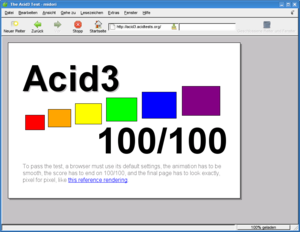 Seems with the latest versions of webkit-gtk and midori, a long-standing crasher-bug got fixed and it now allows you to run the browser-test ACID3.
Seems with the latest versions of webkit-gtk and midori, a long-standing crasher-bug got fixed and it now allows you to run the browser-test ACID3.I just bumped the webkit-gtk ebuild in Gentoo to the latest snapshot.
ACID3 is a test for the standards compliance of modern web browsers. I wrote about ACID2 some years ago.
Wednesday, July 2. 2008
Routable OSM maps on Garmin with MapSource / WINE
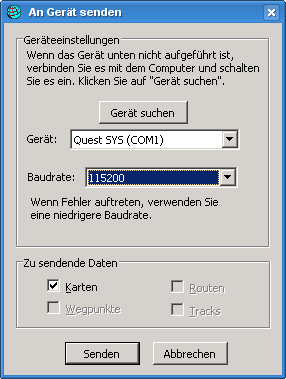 There are two tools out there for Linux to put Garmin maps (which you can convert from OpenStreetMap Data) on devices, sendmap (proprietary) and qlandkarte (free). Sadly, both don't support my device (Garmin Quest), so I had to find an alternative solution. This should also work with other garmin devices.
There are two tools out there for Linux to put Garmin maps (which you can convert from OpenStreetMap Data) on devices, sendmap (proprietary) and qlandkarte (free). Sadly, both don't support my device (Garmin Quest), so I had to find an alternative solution. This should also work with other garmin devices.After some playing around, I managed to get it running with MapSource on wine. I've used wine 1.1.0 on Gentoo, if you have problems, be sure to get a recent wine version.
Steps to do:
- Download MapSource_6137.exe from the Garmin webpage.
- Use 7-Zip to unpack the exe to some directory: 7z x MapSource_6137.exe
- Install MAIN.msi: wine start MAIN.msi
- Install MapSource: wine Setup.exe
- Get one of the MapSource Installers from here and install it: wine Setup_OSM-Germany-2008-06-11.exe
- wine doesn't support usb, so you need the garmin_gps module. If it's installed on your system, it should load automatically after attaching your device and switching it on.
- You should now have a device ttyUSB0, which you need to symlink as com1 for wine: ln -s /dev/ttyUSB0 ~/.wine/dosdevices/com1
- Run MapSource: wine ~/.wine/drive_c/MapSource/MapSource.exe
- Go to Settings -> Transfer, there you can select a serial port. Select COM1.
- Click the map selection tool from the buttons and select an area.
- Select Transfer -> Transfer to device. If everything went fine, it'll detect your garmin device attached to the serial port and you can start your upload.
Tuesday, June 17. 2008
Linux on a Wii
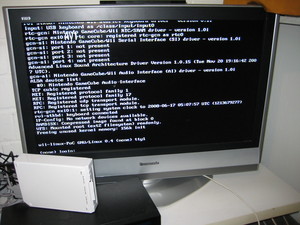 Today I played around a bit with the stuff done by the Wii homebrew/hacking community, which is far more advanced than I had expected.
Today I played around a bit with the stuff done by the Wii homebrew/hacking community, which is far more advanced than I had expected.I had the game Twilight Princess borrowed by a friend. For those who don't know, using this game you can run homebrew software on the Wii without the need of a modchip.
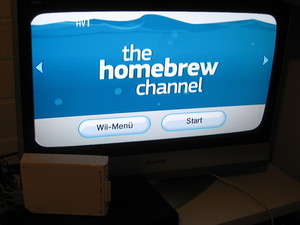 The way this works is that first you install a modified savegame for Twilight Princess, afterwards you can install the Homebrew Channel. The Homebrew Channel will stay in the main Wii Menu and you'll be able to run various stuff from there. While looking around the various webpages covering the topic, I found that wiibrew.org is a good place to find documentation and links to the appropriate projects. So look there for the details.
The way this works is that first you install a modified savegame for Twilight Princess, afterwards you can install the Homebrew Channel. The Homebrew Channel will stay in the main Wii Menu and you'll be able to run various stuff from there. While looking around the various webpages covering the topic, I found that wiibrew.org is a good place to find documentation and links to the appropriate projects. So look there for the details.The gc-linux project (originally porting linux to the gamecube) has a simple Linux image available.
A warning: Nintendo released a new firmware that stops this method to work, so if you wanna have fun, don't update your Wii. And the obvious warning: Everything you do is at your own risk.
Update: Seems the Firmware update is no longer a problem.
Posted by Hanno Böck
in Code, Computer culture, English, Gentoo, Linux
at
23:52
| Comments (3)
| Trackback (1)
Thursday, June 12. 2008
0.01 % of Xorg
Phoronix has just published an article about the development of xorg and they have a statistics of contributors from Distributions.
I'm listed there on the Gentoo part with 0.01 % contributions to Xorg. Yay!
I'm listed there on the Gentoo part with 0.01 % contributions to Xorg. Yay!
Tuesday, June 3. 2008
Video editing with Cinelerra
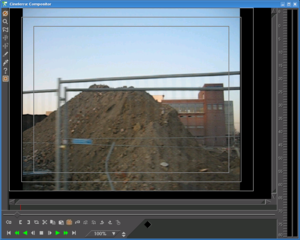 Sometimes in the past I had the wish to produce some simple videos, e. g. from political actions. Though I was looking for some free software solutions for video editing.
Sometimes in the past I had the wish to produce some simple videos, e. g. from political actions. Though I was looking for some free software solutions for video editing.I asked around but it seemed that most people didn't use free solutions. I never did any video editing before, so I had no comparison on what proprietary tools are able to do. My requirements where not that advanced, basically I wanted to be able to cut some videos together, fade them in and out, add some text over them. Beside, I wanted to be able to display images for some seconds.
I knew of three free video editing tools for linux, Kino, PiTiVi and Cinelerra. Kino and PiTiVi are quite simple to use, they have an intuitive interface. But I soon came to the conclusion that they are far too limited in features. So Cinelerra is left.
Cinelerra is not a simple tool, it's interface is not intuitive. So this was keeping me away from using it for a long time. But the good news is, Cinelerra has all the features I wanted and can do much more. As I said above, I don't have any experience with commercial tools, but I think Cinelerra can do pretty much everything one will need when doing professional video editing.
To learn how to use Cinelerra, there are some great video tutorials at the_source. It's a (CC-by licensed) video show about free software and video stuff and they did four Cinelerra tutorials in their show. You should at least watch the first three and try the stuff out between the tutorials, but that will give you the basic knowledge to get started with Cinelerra.
So, the first Cinelerra-produced video by me should be available here within the next days.
Beside, I just bumped the Cinelerra package in Gentoo, so emerge it and have fun.
Posted by Hanno Böck
in Computer culture, Gentoo, Linux, Movies
at
15:15
| Comments (2)
| Trackbacks (0)
Friday, May 16. 2008
Tic Tac Toe over Jabber
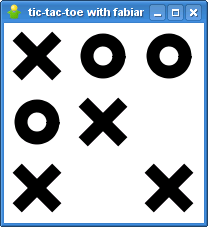 One of the missing features in jabber most commercial instant messaging systems have are small games one can easily play over them. Till now, because just yesterday, gajim got support for Tic Tac Toe over jabber.
One of the missing features in jabber most commercial instant messaging systems have are small games one can easily play over them. Till now, because just yesterday, gajim got support for Tic Tac Toe over jabber.Which reminds me tic tac toe was one of the first »programming projects« I did in the past, some day I'll have to dig out the sources and publish them. My next wish would be something like tetrinet over jabber.
Gajim-svn ebuild is in my overlay at http://svn.hboeck.de/overlay/.
Posted by Hanno Böck
in English, Gentoo, Linux, Retro Games
at
00:45
| Comments (2)
| Trackbacks (0)
Monday, April 21. 2008
gajim with otr encryption
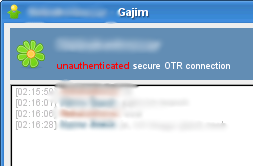 In the instant messaging world, encryption is a bit of a problem. There is no single standard that all clients share, mostly two methods of encryption are out there: pgp over jabber (as defined in the xmpp standard) and otr.
In the instant messaging world, encryption is a bit of a problem. There is no single standard that all clients share, mostly two methods of encryption are out there: pgp over jabber (as defined in the xmpp standard) and otr.Most clients only support either otr (pidgin, adium) or pgp (gajim, psi), for a long time I was looking for a solution where both methods work. psi has otr-patches, but they didn't work when I tried them. kopete also has an otr-plugin, but I've not tested that yet.
Today I found that there is an otr-branch of gajim, which is my everyday client, so this would be great. As you can see on the picture, it seems to work on a connection with an ICQ user using pidgin.
I've created some ebuilds in my overlay (the code is stored in bazaar, I've copied the bzr eclass from the desktop effects overlay):
svn co https://svn.hboeck.de/overlay
ping with IDN
 Today I asked myself if I can ping an IDN host.
Today I asked myself if I can ping an IDN host.My default ping (iputils on linux) couldn't do it, but I found some patches out there, e.g. from Fedora. Thanks to SpanKY, we now also have IDN-enabled ping in Gentoo (he used a modified patch).
Posted by Hanno Böck
in Computer culture, English, Gentoo, Linux
at
01:26
| Comments (2)
| Trackbacks (0)
Wednesday, March 12. 2008
A try on current nouveau
nouveau, the project for creating a free 3D linux driver for nvidia cards, recently got first support for real 3D applications with gallium on some NV4X cards (see Nouveau Companion 36). Today I got it working on a friends machine.
Here you can see an openarena benchmark (also uploaded on youtube). It got 55 fps, which is far away from the nvidia binary driver yet (178 fps), but at least more than my r200 setup (32 fps).
For the brave ones, here's a quick and dirty howto for Gentoo:
a) Get the nouveau overlay with svn co https://svn.hboeck.de/nouveau-overlay and add it to PORTDIR_OVERLAY in make.conf.
b) The nouveau-overlay won't install the nouveau/gallium-branch of mesa. Get my overlay with svn co https://svn.hboeck.de/overlay and also add that to your PORTDIR_OVERLAY (I'll try to contact the nouveau-overlay developer if we can merge this).
b) Add media-libs/mesa, x11-base/x11-drm, x11-libs/libdrm and x11-drivers/xf86-video-nouveau to /etc/portage/package.keywords and merge them.
c) If you've been running the nvidia binary driver, eselect opengl set xorg-x11, change the graphics driver in xorg.conf to nouveau, rmmod nvidia (if you've been running the binary driver), modprobe nouveau and start X.
d) Have fun!
Note: The nouveau developers consider gallium completely unsupported at the moment and don't want to get end-user bugs. If it runs, fine, if not, don't nag them with it.
Here you can see an openarena benchmark (also uploaded on youtube). It got 55 fps, which is far away from the nvidia binary driver yet (178 fps), but at least more than my r200 setup (32 fps).
For the brave ones, here's a quick and dirty howto for Gentoo:
a) Get the nouveau overlay with svn co https://svn.hboeck.de/nouveau-overlay and add it to PORTDIR_OVERLAY in make.conf.
b) The nouveau-overlay won't install the nouveau/gallium-branch of mesa. Get my overlay with svn co https://svn.hboeck.de/overlay and also add that to your PORTDIR_OVERLAY (I'll try to contact the nouveau-overlay developer if we can merge this).
b) Add media-libs/mesa, x11-base/x11-drm, x11-libs/libdrm and x11-drivers/xf86-video-nouveau to /etc/portage/package.keywords and merge them.
c) If you've been running the nvidia binary driver, eselect opengl set xorg-x11, change the graphics driver in xorg.conf to nouveau, rmmod nvidia (if you've been running the binary driver), modprobe nouveau and start X.
d) Have fun!
Note: The nouveau developers consider gallium completely unsupported at the moment and don't want to get end-user bugs. If it runs, fine, if not, don't nag them with it.
Posted by Hanno Böck
in Computer culture, Copyright, English, Gentoo, Linux
at
00:06
| Comments (3)
| Trackbacks (0)
Friday, February 29. 2008
merkaartor, another editor for OpenStreetMap
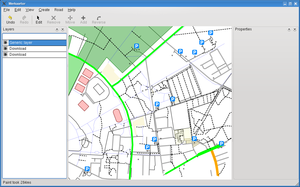 After some more »out of memory«-messages by josm, I thought it's time to look out for alternatives.
After some more »out of memory«-messages by josm, I thought it's time to look out for alternatives.For the openstreetmap-project, the two main editors are josm (java) and potlach (flash). I think using java probably wasn't a very wise decision (I still wonder how an app can get »out of memory« after loading about 5 MB of images, do they create a pixel class and store every pixel in an object?) and I don't like flash either.
There's another project called merkaartor and today I had a look. My first feeling is that it's promising. It has good performance, it does nice live-rendering and it supports the basic features (adding nodes and ways, up/downloading stuff to the osm-system).
Sure, comparing to the large list of plugin features josm has, it's limited. Maybe I'll try to hack in some bits I'm missing at the moment.
In my continuing effort to improve gentoo for geo-related stuff, I've just added a merkaartor package to portage.
Friday, February 15. 2008
Time-syncing external devices like cameras, mobiles
I recently wrote about geo-tagged images. This makes use of the fact that different devices collect data and you can associate the data by the timestamp. It's most probably interesting for much more than gps/images.
While it's possible to get accurate timesetting by hand, it's usually not what you want. Preferably one wants to sync all devices with an internal clock automatically from the computer or some kind of network connection.
As a first step, we want to get our computer's time accurate. There are tons of tools out there, some linux distributions (and also windows xp) do this automatically on boot. I'm usually using rdate, it's small and simple:
There's a list of public time servers here. Other tools like netdate, ntpdate etc. will do it as well.
Now, my digital camera is a Canon Ixus 50. It uses PTP (picture transfer protocol) for data communication. If you have a PTP camera, most likely it supports time syncing. Syncing the camera time to the system time was recently added to libgphoto svn, but it's not yet available in a release. It also doesn't support any timezone management yet, so I'll get GMT time (while I live in the CET zone). The command to do it is:
If you don't have PTP, you're not completely lost. There's support for a lot of proprietary cameras in gphoto, some of them also support time syncing. Give it a try. I don't have information about usb storage devices (many cameras are just storage devices), links welcome.
Next device is my mobile phone, Nokia 6230i. As a mobile phone is permanently connected to the GSM-network, the obvious option would be time syncing over gsm. This protocol exists and most phones (including mine) support that. But bad luck, many mobile providers don't support it. So I'm out of luck here (vodafone, pointers to information about different provider support that are welcome).
Now, this device also speaks bluetooth, so timesetting via the computer should be possible. Both gammu and gnokii (the common applications to talk with all those proprietary mobiles out there) have a timesetting-option, but it rounds down the time to zero seconds, thus making it useless for exact time. I'm not yet sure if this is a limitation of the hardware or a bug in the software. An option would be to send the timesync-signal at the moment seconds turn to zero, but that would require application support, as there's a relevant diff between the application call and the moment the time get's set (because you have to ack the connection on the phone).
Though at the moment my phone needs manual timesetting, but the only data I'm collecting with it is gps-data, which get's it's timestamp via gps, so this is fine.
While it's possible to get accurate timesetting by hand, it's usually not what you want. Preferably one wants to sync all devices with an internal clock automatically from the computer or some kind of network connection.
As a first step, we want to get our computer's time accurate. There are tons of tools out there, some linux distributions (and also windows xp) do this automatically on boot. I'm usually using rdate, it's small and simple:
rdate -s [any public timeserver]
There's a list of public time servers here. Other tools like netdate, ntpdate etc. will do it as well.
Now, my digital camera is a Canon Ixus 50. It uses PTP (picture transfer protocol) for data communication. If you have a PTP camera, most likely it supports time syncing. Syncing the camera time to the system time was recently added to libgphoto svn, but it's not yet available in a release. It also doesn't support any timezone management yet, so I'll get GMT time (while I live in the CET zone). The command to do it is:
gphoto2 --set-config synctime=on
If you don't have PTP, you're not completely lost. There's support for a lot of proprietary cameras in gphoto, some of them also support time syncing. Give it a try. I don't have information about usb storage devices (many cameras are just storage devices), links welcome.
Next device is my mobile phone, Nokia 6230i. As a mobile phone is permanently connected to the GSM-network, the obvious option would be time syncing over gsm. This protocol exists and most phones (including mine) support that. But bad luck, many mobile providers don't support it. So I'm out of luck here (vodafone, pointers to information about different provider support that are welcome).
Now, this device also speaks bluetooth, so timesetting via the computer should be possible. Both gammu and gnokii (the common applications to talk with all those proprietary mobiles out there) have a timesetting-option, but it rounds down the time to zero seconds, thus making it useless for exact time. I'm not yet sure if this is a limitation of the hardware or a bug in the software. An option would be to send the timesync-signal at the moment seconds turn to zero, but that would require application support, as there's a relevant diff between the application call and the moment the time get's set (because you have to ack the connection on the phone).
Though at the moment my phone needs manual timesetting, but the only data I'm collecting with it is gps-data, which get's it's timestamp via gps, so this is fine.
Friday, February 8. 2008
openvas, the successor of nessus
Over two years ago, it was announced that the security scanner nessus will no longer be free software starting with version 3.0. Soon after that, several forks were announced. For a long time, none of these fork-projekts produced any output.
openvas was one of that forks and from my knowledge the only one that ever produced any releases. It recently had 1.0-releases for all packages, I just added ebuilds to gentoo.
While openvas isn't perfect yet (many of the old plugins fail, because some files had to be removed due to unclear licensing), it's nice to see that we have a free, maintained security scanner again that will fill the gap left by nessus.
openvas was one of that forks and from my knowledge the only one that ever produced any releases. It recently had 1.0-releases for all packages, I just added ebuilds to gentoo.
While openvas isn't perfect yet (many of the old plugins fail, because some files had to be removed due to unclear licensing), it's nice to see that we have a free, maintained security scanner again that will fill the gap left by nessus.
Wednesday, October 24. 2007
Compiz Fusion hits Gentoo
I know you've been waiting far too long for that. Now that Compiz and Compiz Fusion 0.6 are out, I've added them to portage.
The background: Compiz and Beryl, the two famous 3D-composite/windowmanagers for Linux, have merged forces. Main Compiz still resides in the package x11-wm/compiz, many additional plugins and tools are fetched in by the x11-wm/compiz-fusion metapackage.
The ebuilds are all based on the xeffects overlay, with some cleanup by me.
Happy window-wobbling!
The background: Compiz and Beryl, the two famous 3D-composite/windowmanagers for Linux, have merged forces. Main Compiz still resides in the package x11-wm/compiz, many additional plugins and tools are fetched in by the x11-wm/compiz-fusion metapackage.
The ebuilds are all based on the xeffects overlay, with some cleanup by me.
Happy window-wobbling!
Posted by Hanno Böck
in Computer culture, English, Gentoo, Linux
at
01:54
| Comments (8)
| Trackbacks (0)
Monday, October 15. 2007
Free documentary about free software
Today I found a note about the movie The Codebreakers. It's a free-licensed (cc-by-sa) documentary about free software in development countries.
It brings up different examples about successful usage of free software in different parts of the world. Worth watching.
It brings up different examples about successful usage of free software in different parts of the world. Worth watching.
Posted by Hanno Böck
in Code, Copyright, English, Gentoo, Linux, Movies, Politics
at
02:14
| Comments (3)
| Trackbacks (0)
Defined tags for this entry: creativecommons, developingworld, freeculture, freesoftware, linux, movie
Saturday, September 8. 2007
Make Gentoo OSM-ready
I recently added some stuff to gentoo for openstreetmap and gps-related work.
For one, the java openstreetmap editor josm now has ebuilds. josm and josm-plugins, the first only installs the program itself plus language packs, the second installs most of the josm-plugins available. They can be enabled within the configuration.
I was a bit unsure how to handle it, as I first thought about adding some basic plugins to the josm-package itself. But as the opinions on what »basic« plugins are seem to differ a lot, I decided to do it this way.
Another new package is gebabbel, a gui-frontend for gpsbabel. gpsbabel is a commandline-tool that implements various proprietary gps coordinate formats and allows access to many gps-devices (e. g. garmin). Beside it can be used to filter and convert gps-tracks.
More to come. Probably also interesting stuff in portage is gpsdrive (which has some osm-stuff in svn, but not yet in a release), marble (world-view-tool for kde, osm-support is planned within the next months). Other stuff not yet in portage, I plan to make packages in the future: tiles@home, qlandkarte, mapnik and probably everything it takes to run an osm-server.
A bit offtopic, as gentoo doesn't run on mobiles (yet): Mobile Trail Explorer is the only free (as in freedom) software I found for J2ME-mobiles to create gps-tracks. It's a bit alpha, lacking some features and unstable, but it's free, so I hope it'll become better soon. It's a cheap way to get gps-tracks, assuming that you already have a java/bluetooth-mobile and you can get a gps-mouse starting at about 50 €.
If you have more suggestions for gps/osm-related stuff, feel free to open requests on the gentoo bugzilla and add me to the cc.
For one, the java openstreetmap editor josm now has ebuilds. josm and josm-plugins, the first only installs the program itself plus language packs, the second installs most of the josm-plugins available. They can be enabled within the configuration.
I was a bit unsure how to handle it, as I first thought about adding some basic plugins to the josm-package itself. But as the opinions on what »basic« plugins are seem to differ a lot, I decided to do it this way.
Another new package is gebabbel, a gui-frontend for gpsbabel. gpsbabel is a commandline-tool that implements various proprietary gps coordinate formats and allows access to many gps-devices (e. g. garmin). Beside it can be used to filter and convert gps-tracks.
More to come. Probably also interesting stuff in portage is gpsdrive (which has some osm-stuff in svn, but not yet in a release), marble (world-view-tool for kde, osm-support is planned within the next months). Other stuff not yet in portage, I plan to make packages in the future: tiles@home, qlandkarte, mapnik and probably everything it takes to run an osm-server.
A bit offtopic, as gentoo doesn't run on mobiles (yet): Mobile Trail Explorer is the only free (as in freedom) software I found for J2ME-mobiles to create gps-tracks. It's a bit alpha, lacking some features and unstable, but it's free, so I hope it'll become better soon. It's a cheap way to get gps-tracks, assuming that you already have a java/bluetooth-mobile and you can get a gps-mouse starting at about 50 €.
If you have more suggestions for gps/osm-related stuff, feel free to open requests on the gentoo bugzilla and add me to the cc.
Posted by Hanno Böck
in Code, English, Gentoo, Linux
at
15:51
| Comments (2)
| Trackbacks (0)
Defined tags for this entry: gebabbel, gentoo, gps, gpsbabel, josm, mobiletrailexplorer, openstreetmap
« previous page
(Page 3 of 9, totaling 127 entries)
» next page